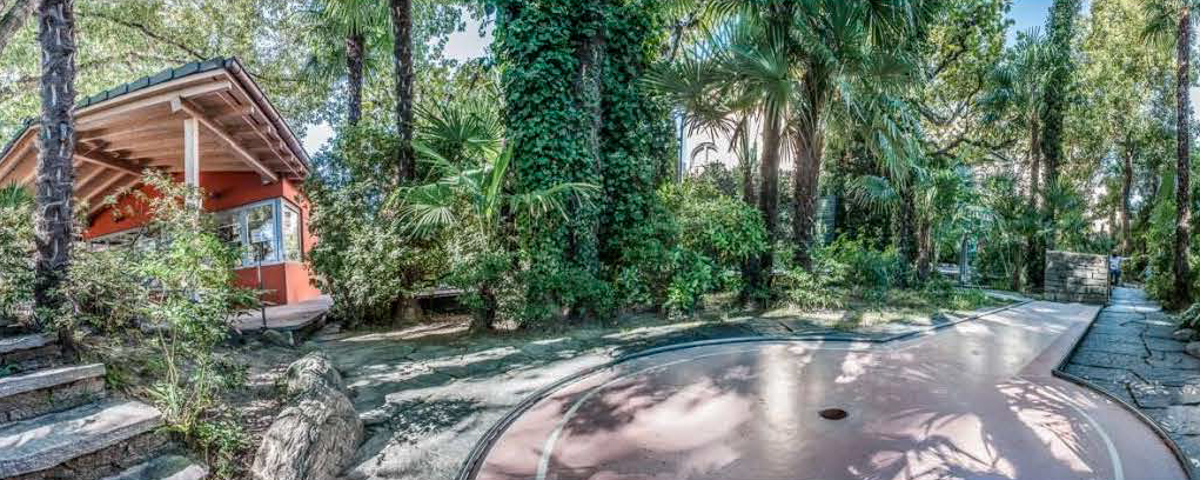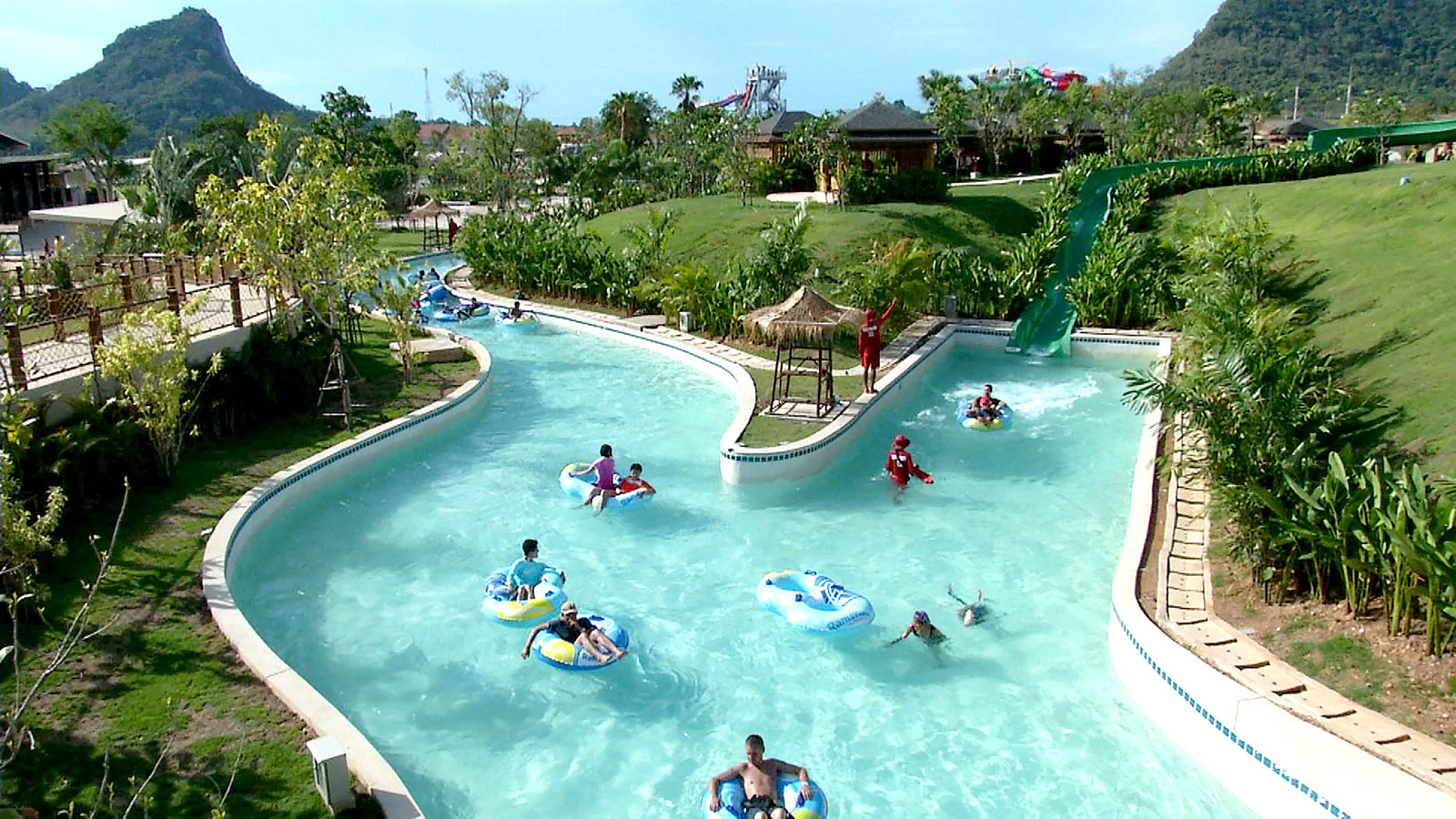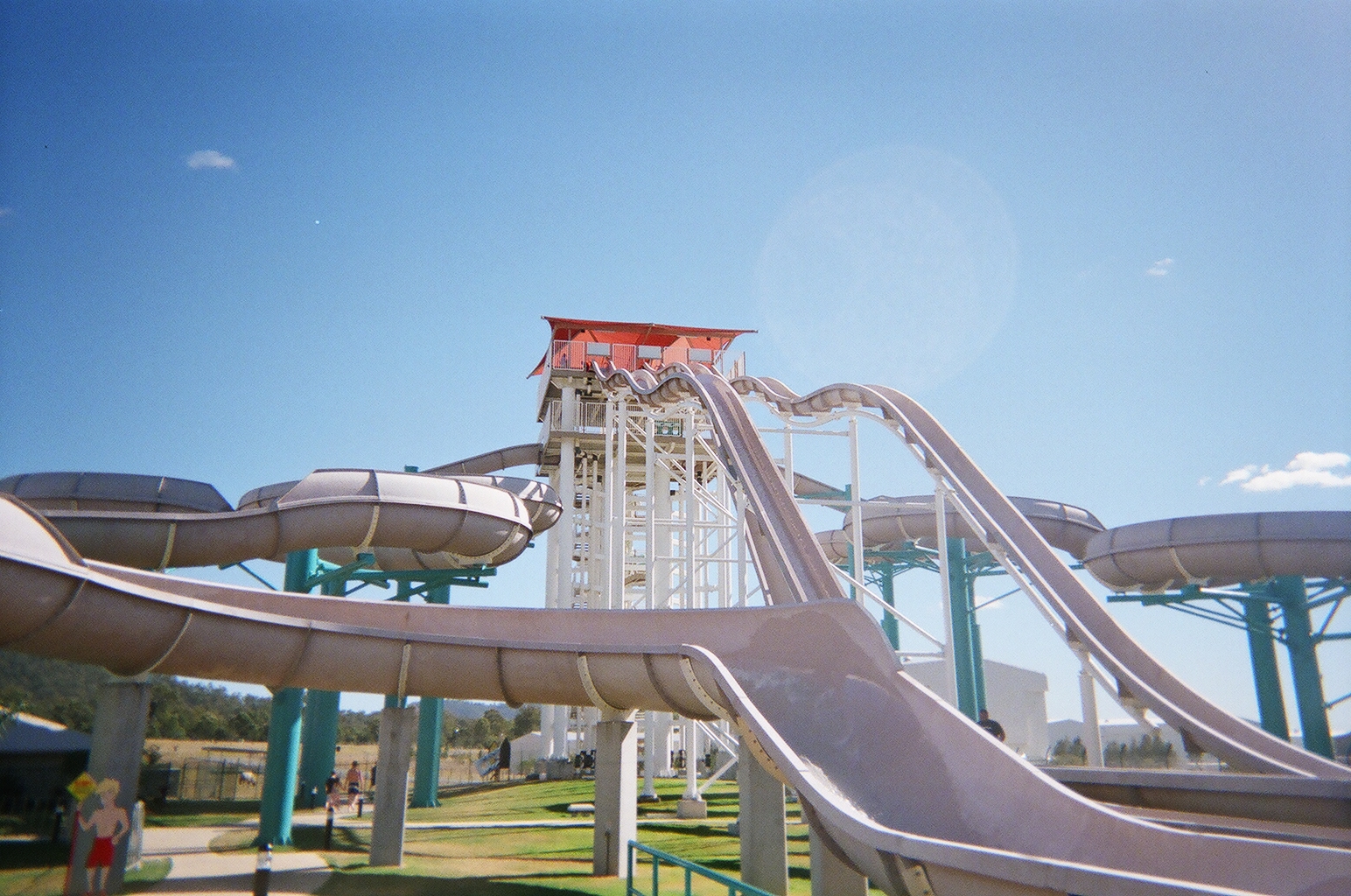|
Magic Mountain Water Park
Magic Mountain (french: Parc aquatique Magic Mountain), is mainly a water park, which is located in Moncton, New Brunswick, Canada. It is part of the Magnetic Hill tourist site. The park is the largest man-made tourist attraction in Atlantic Canada. History The park was created as an addition to the growing tourist site of Magnetic Hill, which already consisted of the hill itself, and the Magnetic Hill Zoo. Construction on the park commenced on August 12, 1986 and through the efforts of more than 600 construction workers it was completed in less than a year, opening on June 26, 1987. It requires more than of water to operate which is heated by propane heaters with a capacity of almost 7 million BTUs (7.4 gigajoules). In 1999 the park came under new ownership and since then several improvements have been made to the park. A children's "Splash pad", two new children's slides and two new body slides named "Pipeline" and "Sidewinder" were constructed. Other developments incl ... [...More Info...] [...Related Items...] OR: [Wikipedia] [Google] [Baidu] |
Gigajoule
The joule ( , ; symbol: J) is the unit of energy in the International System of Units (SI). It is equal to the amount of work done when a force of 1 newton displaces a mass through a distance of 1 metre in the direction of the force applied. It is also the energy dissipated as heat when an electric current of one ampere passes through a resistance of one ohm for one second. It is named after the English physicist James Prescott Joule (1818–1889). Definition In terms of SI base units and in terms of SI derived units with special names, the joule is defined as One joule can also be defined by any of the following: * The work required to move an electric charge of one coulomb through an electrical potential difference of one volt, or one coulomb-volt (C⋅V). This relationship can be used to define the volt. * The work required to produce one watt of power for one second, or one watt-second (W⋅s) (compare kilowatt-hour, which is 3.6 megajoules). This relationship can be ... [...More Info...] [...Related Items...] OR: [Wikipedia] [Google] [Baidu] |
1987 Establishments In New Brunswick
File:1987 Events Collage.png, From top left, clockwise: The MS Herald of Free Enterprise capsizes after leaving the Port of Zeebrugge in Belgium, killing 193; Northwest Airlines Flight 255 crashes after takeoff from Detroit Metropolitan Airport, killing everyone except a little girl; The King's Cross fire kills 31 people after a fire under an escalator flashes-over; The MV Doña Paz sinks after colliding with an oil tanker, drowning almost 4,400 passengers and crew; Typhoon Nina strikes the Philippines; LOT Polish Airlines Flight 5055 crashes outside of Warsaw, taking the lives of all aboard; The USS Stark is struck by Iraqi Exocet missiles in the Persian Gulf; U.S. President Ronald Reagan gives a famous speech, demanding that Soviet leader Mikhail Gorbachev tears down the Berlin Wall., 300x300px, thumb rect 0 0 200 200 Zeebrugge disaster rect 200 0 400 200 Northwest Airlines Flight 255 rect 400 0 600 200 King's Cross fire rect 0 200 300 400 Tear down this wall! rect 300 200 60 ... [...More Info...] [...Related Items...] OR: [Wikipedia] [Google] [Baidu] |
Water Parks In Canada
Water (chemical formula ) is an inorganic, transparent, tasteless, odorless, and nearly colorless chemical substance, which is the main constituent of Earth's hydrosphere and the fluids of all known living organisms (in which it acts as a solvent). It is vital for all known forms of life, despite not providing food, energy or organic micronutrients. Its chemical formula, H2O, indicates that each of its molecules contains one oxygen and two hydrogen atoms, connected by covalent bonds. The hydrogen atoms are attached to the oxygen atom at an angle of 104.45°. "Water" is also the name of the liquid state of H2O at standard temperature and pressure. A number of natural states of water exist. It forms precipitation in the form of rain and aerosols in the form of fog. Clouds consist of suspended droplets of water and ice, its solid state. When finely divided, crystalline ice may precipitate in the form of snow. The gaseous state of water is steam or water vapor. Water covers ab ... [...More Info...] [...Related Items...] OR: [Wikipedia] [Google] [Baidu] |
Miniature Golf
Miniature golf, also known as minigolf, mini-putt, crazy golf, or putt-putt, is an offshoot of the sport of golf focusing solely on the putting aspect of its parent game. The aim of the game is to score the lowest number of points. It is played on courses consisting of a series of holes (usually a multiple of 9) similar to its parent, but characterized by their short length (usually within 10 yards from tee to cup). The game uses artificial putting surfaces (such as carpet, artificial turf, or concrete), a geometric layout often requiring non-traditional putting lines such as bank shots, and artificial obstacles such as tunnels, tubes, ramps, moving obstacles such as windmills, and walls of concrete, metal, or fiberglass. When miniature golf retains many of these characteristics but without the use of any props or obstacles, it is purely a mini version of its parent game. Nomenclature While the international sports organization World Minigolf Sport Federation (WMF) prefers to ... [...More Info...] [...Related Items...] OR: [Wikipedia] [Google] [Baidu] |
Wave Pool
A wave pool is a swimming pool in which there are artificially generated, large waves, similar to those of the ocean. Wave pools are often a major feature of water parks, both indoors and outdoors, as well as some leisure centres. History The origins of wave pools go as far back as the 19th century, as famous fantasy castle builder Ludwig II of Bavaria electrified a lake to create breaking waves. In 1905, the "Undosa" swimming platform was built on Lake Starnberg in Germany, which used large pontoons to force the lake water to make waves. It has since been converted into a restaurant. In 1912, the "Bilzbad" in Radebeul, Germany was the first public wave pool built on the ground.Peter Westwick & Peter NeushulThe World in the Curl: An Unconventional History of Surfing/ref> It used a wave machine, also called "Undosa," first exhibited the previous year at the International Hygiene Exhibition in Dresden. It still operates. Another early public wave pool was designed and built ... [...More Info...] [...Related Items...] OR: [Wikipedia] [Google] [Baidu] |
Lazy River
A lazy river is a water ride found in water parks, hotels, resorts, and recreation centers, which usually consists of a shallow () pool that flows similarly to a river. There is generally a slow current, usually just enough to allow guests to gently ride along lying on rafts. The current is generated by means of a gradual slope in the terrain, aided by a pumping mechanism that allows for the river to continue flowing infinitely. There may also be scenic elements added, such as small waterfalls on the edge of the river. Some connect or lead into swimming pools or wave pools, while others are self-contained courses that simply complete a circuit. A torrent river, or wave river, is a related concept. Torrent rivers feature wave machines similar to those that are in wave pools; the waves then push riders (who are on rafts, as they are in a regular lazy river) around the river faster than they would be traveling in a regular lazy river. Torrent rivers appear at all of the Schlitter ... [...More Info...] [...Related Items...] OR: [Wikipedia] [Google] [Baidu] |
Water Slide
A water slide (also referred to as a flume, or water chute) is a type of slide designed for warm-weather or indoor recreational use at water parks. Water slides differ in their riding method and therefore size. Some slides require riders to sit directly on the slide, or on a raft or tube designed to be used with the slide. A typical water slide uses a pump system to pump water to the top which is then allowed to freely flow down its surface. The water reduces friction so sliders travel down the slide very quickly. Water slides run into a swimming pool (often called a plunge pool) or a long run-out chute. A lifeguard is usually stationed at the top and the bottom of the slide, so that if a rider gets hurt they will be treated immediately. Traditional water slides Body slides Body slides feature no mat or tube, instead having riders sit or lie directly on the surface of the slide. The simplest resemble wet playground slides. There are a variety of types of body slides in ... [...More Info...] [...Related Items...] OR: [Wikipedia] [Google] [Baidu] |
British Thermal Unit
The British thermal unit (BTU or Btu) is a unit of heat; it is defined as the amount of heat required to raise the temperature of one pound of water by one degree Fahrenheit. It is also part of the United States customary units. The modern SI unit for heat energy is the joule (J); one BTU equals about 1055 J (varying within the range 1054–1060 J depending on the specific definition; see below). While units of heat are often supplanted by energy units in scientific work, they are still used in some fields. For example, in the United States the price of natural gas is quoted in dollars per the amount of natural gas that would give 1 million BTUs (1 "MMBtu") of heat energy if burned. Definitions A BTU was originally defined as the amount of heat required to raise the temperature of 1 avoirdupois pound of liquid water by 1 degree Fahrenheit at a constant pressure of one atmospheric unit. There are several different definitions of the BTU that differ slightly. This ref ... [...More Info...] [...Related Items...] OR: [Wikipedia] [Google] [Baidu] |
Moncton
Moncton (; ) is the most populous city in the Provinces and territories of Canada, Canadian province of New Brunswick. Situated in the Petitcodiac River Valley, Moncton lies at the geographic centre of the The Maritimes, Maritime Provinces. The city has earned the nickname "Hub City" because of its central inland location in the region and its history as a railway and land transportation hub for the Maritimes. As of the 2021 Census, the city had a population of 79,470, a metropolitan population of 157,717 and a land area of . Although the Moncton area was first settled in 1733, Moncton was officially founded in 1766 with the arrival of Pennsylvania German immigrants from Philadelphia. Initially an agricultural settlement, Moncton was not incorporated until 1855. It was named for Lt. Col. Robert Monckton, the British officer who had captured nearby Fort Beauséjour a century earlier. A significant wooden shipbuilding industry had developed in the community by the mid-1840s, allow ... [...More Info...] [...Related Items...] OR: [Wikipedia] [Google] [Baidu] |
Magnetic Hill Zoo
The Magnetic Hill Zoo (french: le Zoo de Magnetic Hill, formerly the Magnetic Hill Game Farm) is a zoo located adjacent to Magnetic Hill and the Magic Mountain in the Magnetic Hill Area of Moncton, New Brunswick. The zoo has over 400 animals, making it the largest zoo in Atlantic Canada. In 2008, the zoo was rated fourth on a list of Canada's top ten zoos. The zoo has been accredited member of the Canadian Association of Zoos and Aquariums (CAZA) since 1993. History The Magnetic Hill Zoo began as the Magnetic Hill Game Farm in 1953. Originally, the game farm was home to orphaned and injured indigenous species like owls, bears, and deer. The city of Moncton took over the park in 1979 and began acquiring more exotic species which served as a catalyst for the renaming the farm to Magnetic Hill Zoo. In 1995, the zoo began a expansion called the African Oasis. At the same time, the zoo also expanded by adding the Primate Conservation Centre, frog bog, the koi pond, bird garden, ... [...More Info...] [...Related Items...] OR: [Wikipedia] [Google] [Baidu] |
Atlantic Canada
Atlantic Canada, also called the Atlantic provinces (french: provinces de l'Atlantique), is the region of Eastern Canada comprising the provinces located on the Atlantic coast, excluding Quebec. The four provinces are New Brunswick, Newfoundland and Labrador, Nova Scotia, and Prince Edward Island. As of 2021, the landmass of the four Atlantic provinces was approximately 488,000 km2, and had a population of over 2.4 million people. The provinces combined had an approximate GDP of $121.888 billion in 2011. The term ''Atlantic Canada'' was popularized following the admission of Newfoundland as a Canadian province in 1949. History The first premier of Newfoundland, Joey Smallwood, coined the term "Atlantic Canada" when Newfoundland joined Canada in 1949. He believed that it would have been presumptuous for Newfoundland to assume that it could include itself within the existing term "Maritime provinces," used to describe the cultural similarities shared by New Brunswick, Prince ... [...More Info...] [...Related Items...] OR: [Wikipedia] [Google] [Baidu] |





